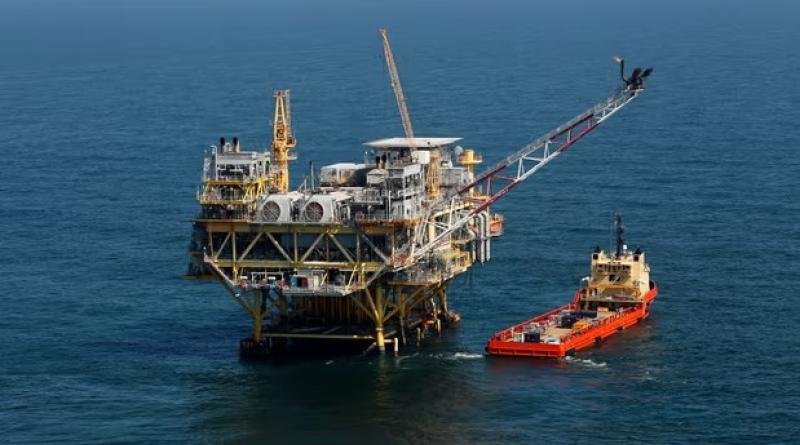Biden to sell three oil and gas leases over five years, angering climate advocates

Administration releases plan, which represents lowest number of lease sales since 1980, but is still set to increase oil production
The Biden administration on Friday released a plan to sell as many as three offshore oil and gas leases over the next five years, garnering criticism from some climate advocates.
Set to govern potential sales through late 2028, the hotly anticipated plan from the Bureau of Ocean Energy Management, a part of the interior department, includes no auctions for next year, and represents the lowest number of lease sales since the program began in 1980.
But the proposal is still set to increase the production of oil – a planet-heating fossil fuel – for decades to come.
“President Biden says that climate change is an existential threat,” Wenonah Hauter, executive director of climate and environmental advocacy group Food and Water Watch, said in an emailed statement. “Unfortunately, this decision is yet another sign that his administration is not willing to take actions that would match that rhetoric.”
All three proposed sales are in the Gulf of Mexico, in 2025, 2027 and 2029, with none in Alaska. “The Biden-Harris administration is committed to building a clean energy future that ensures America’s energy independence,” said the secretary of the interior, Deb Haaland, in a statement, adding that the plan “sets a course for the department to support the growing offshore wind industry and protect against the potential for environmental damage and adverse impacts to coastal communities”.
Top scientists have long warned that the world must not permit any additional oil, coal or gas to avert the worst impacts of the climate crisis. But a provision in the 2022 Inflation Reduction Act provision blocked the interior department from issuing new offshore wind leases unless in the prior year it had held an oil lease sale on at least 60m acres.
The requirement was developed by the West Virginia senator Joe Manchin, a Democrat who has made a fortune in the fossil fuel business.
“This shortsighted political dealmaking will continue to have grave consequences,” said Hauter of Food and Water Watch.
In a statement, the Department of Interior said the plan was “in line with the Biden-Harris administration’s goal of net-zero emissions by 2050”, and that it includes the “minimum number” needed to meet that requirement. The administration is depending on the quick adoption of offshore wind, including in the Gulf of Maine and the Oregon coast, to help meet its climate goals, with a goal of installing 30 gigawatts by the end of this decade.
But the non-profit environmental law organization Earthjustice analyzed the requirements of the Inflation Reduction Act and said that even in the strictest interpretation of the law, the agency would only need to include one additional oil-and-gas lease sale in the final five-year program to allow for all planned federal offshore wind leasing.
“It’s very important that the Biden administration is scaling back plans for oil and gas leasing, and it’s essential to create the runway for a transition to offshore wind. But this five-year plan also represents a crucial missed opportunity to minimize future oil and gas drilling,” said the president of Earthjustice, Abigail Dillen.
The US currently accounts for more than a third of the expansion of global oil and gas production planned by 2050, according to a recent analysis.
Even if the Biden administration had included zero lease sales in its five-year plan, oil production in the US would have been on track to reach an all-time high. Production will average 13.1m barrels a day in 2024, national data shows – enough to keep the US in its current role as the top producer of global crude oil.
Environmental justice advocates in the Gulf, which is currently the nation’s primary source of offshore oil and gas, were incensed by the new proposal.
“We say enough is enough. We refuse to be sacrificed,” John Beard, founder and executive director of the Port Arthur Community Action Network. “We reject the five-year plan, and demand that President Biden treat us like living people, not pawns in a Petrochemical power-play for profits at the expense of our lives, health and futures.”
Haaland previously delayed the plan’s release, eliciting criticism from fossil fuel interests. The new plan is likely to upset the industry as well.
The administration signalled in an earlier draft of the plan that it would auction off up to 11 offshore oil and gas leases, 10 in the Gulf of Mexico and one in Alaska’s Cook Inlet.
The previous Obama-era plan, which expired 30 June 2022, contained 11 sales. In 2018, the Trump administration proposed including a potential 47 lease sales in a new plan.
In addition to creating new climate-heating emissions, advocates said the new leasing plan was a problem for marine ecosystems.
“Every new drilling lease is a disaster waiting to happen,” said Beth Lowell, the United States vice-president of the conservation non-profit Oceana. “We know when companies drill, they spill, and offshore disasters impact communities, people and businesses who rely upon a healthy ocean.”
The House and Senate will now have 60 days to review the plan and advance legislation making changes.
“Congress must immediately reject this proposal during the review period and prevent all new leases on federal waters,” said Lowell.
Photograph: Gerald Herbert/AP - A rig and supply vessel in the Gulf of Mexico, off the coast of Louisiana. All three proposed sales are in the Gulf of Mexico, in 2025, 2027 and 2029.




